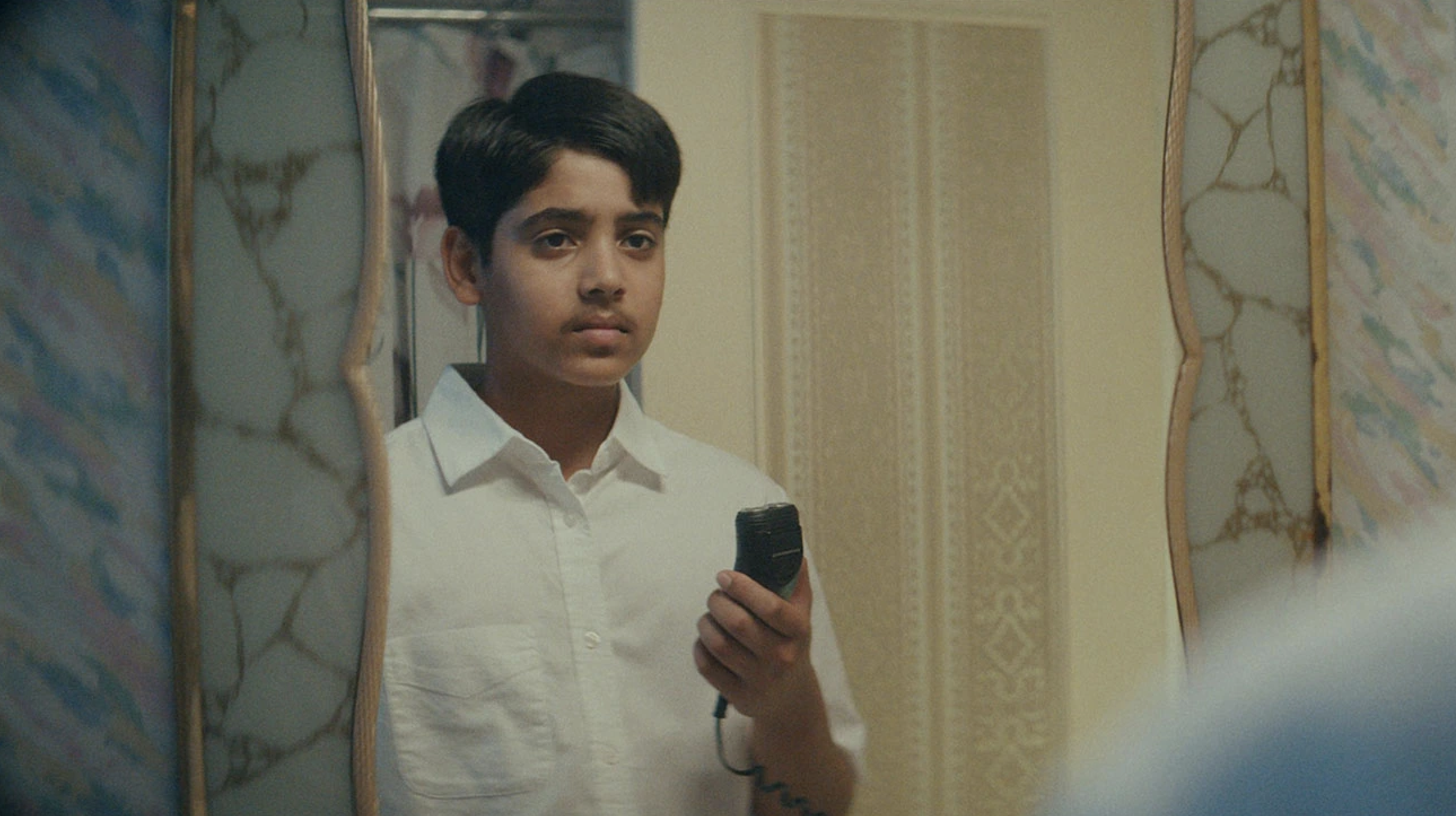A feature debut and homage to coming-of-age films, nineties nostalgia, and awkward teenage transitions, MUSTACHE, written and directed by Imran J. Khan, won the Audience Award at SXSW and poses to be a new classic. The film begins with 13-year-old Ilyas’s (Atharv Verma) voiceover, as he contemplates the multiverse and whether there’s a place for him. Where mainstream narratives are overcrowded with pre-existing intellectual property, superheroes and white characters alike, Khan centers a Pakistani American community of Northern California with tenderness and humor, tackling familiar tropes like teenage angst and rebellion with the specificity of autobiography, thus channeling an intimate and inspired vision of growing up Muslim in the 90s.
Ilyas narrates how he’s stuck in the “complex lattice of rules” governing his life, as he reflects on his Muslim upbringing that will have him choose obedience over self-interest, when he’s forced to keep his prominent mustache having grown much too soon for his liking. It makes him the subject of ridicule at Cordoba, his private Islamic school, which he is soon pushed to leave for a public high school after an altercation results in his losing the scholarship that made his attendance possible.
Ilyas’s mustache represents his insecurity, self-loathing, and the dissonance he experiences—being caught between the boy he is and the man he’s supposed to become. A recurring motif in the film: the sudden zip and wail of an electric shaver, followed by extreme close-ups of facial hair, and a montage of images mapping the emotional chaos of his mind. The drone of the razor follows Ilyas like a horror villain might, except he’s being haunted by choices that seem unavailable to him.
For most of the film, he orchestrates a plot to return to Cordoba with the help of Yasmeen (Ayana Manji), his childhood friend whom he consults over Instant Messenger. Ilyas’s move to public high school becomes an analogue to the story of immigration. Once having believed Cordoba would always be home, Ilyas now wonders if he needs to leave home to flourish. Wishing to return to the comfort of his community, Ilyas plays on his parents’ fears as he performs being a Bad Muslim, leading to a humorous scene where he pretends to eat a Big Mac. In his new environment, Ilyas becomes the perpetual outcast: the film observes his marginalization, as Ilyas remains muted and invisible, and his hopes for assimilation, as Ilyas fixates on his classmate Liz (Melody Cao), suggesting that romantic love could be the answer to his search for belonging.
After stumbling upon a theater class during his free period and joining the group, Ilyas soon taps into the lesson that his body is a tool of expression to be embraced. He need not suppress his feelings or avoid the spotlight out of shame and fear. In acting, he’s found his superpower and a way to travel the multiverse, ultimately finding a home and story within, waiting to be told. Where Ilyas’s mother, Asiya (Meesha Shafi), gave up painting to raise her children, as the evidence of her art remains on their home’s walls, Khan, through Ilyas, shows us how their lives and community are worthy of art, in all their awkwardness and glory. Having once taken his mother’s art for granted, Ilyas becomes emboldened by her example.
Like Ilyas’s daring, culminating performance in front of his entire community, this film is full of heart—coursing through its design, it’s palpable that it’s been made with tremendous love. No matter who we think we are or should be, the film reminds us that we’re all a little strange, sharing the same fear of ridicule or rejection. MUSTACHE shows us how our communities should welcome and celebrate its differences, and how inclusivity starts with an open mind. Who knows, even when things get awkward, there might be room for us to be taken by surprise and find joy in the unexpected. Before we brave the stage and take our place, the search for acceptance must first come from within before we can wear it proudly on our faces.
Joseph Han is the author of Nuclear Family, named a New York Times Book Review Editors’ Choice and a best book of the year by NPR and Time Magazine. He is a 2022 National Book Foundation ‘5 Under 35’ honoree and an Affiliate Faculty in Fiction at the Antioch University Los Angeles low-residency MFA program.
Beginning in 2010, Film for Thought (FFT), a collaborative program between HIHumanities and HIFF, was born. Film For Thought is a special program designed to inspire critical discourse and community dialogue through the medium of film. Celebrating the longstanding relationship between HIHumanities and HIFF, FFT features a select group of films that resonate particularly with aspects of the humanities. As part of this programming, HIHumanities invites humanities scholars to respond to these selected films through written essays and panel discussions.



